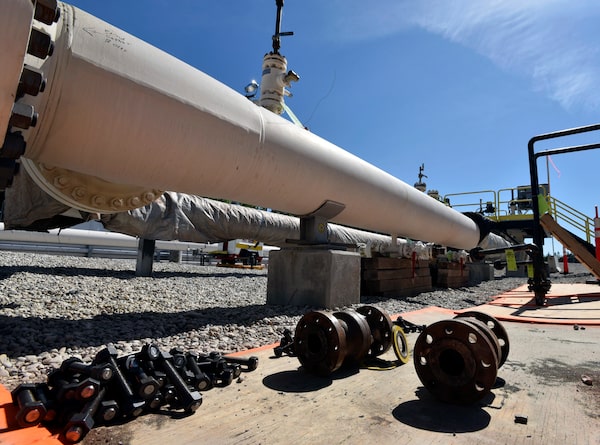
Line 5 carries petroleum from Western Canada through Great Lakes states to Ontario, where much of the crude is turned into gasoline and other fuels before the remainder is shipped through the Line 9 pipeline to Quebec refineries.Dale G. Young/The Associated Press
A senior Enbridge Inc. executive told members of Parliament on Tuesday that Canada must fight hard to rescue a key petroleum transmission line running through the United States because it would be even harder to build a cross-Canadian pipeline to replace it.
Vern Yu, an executive vice-president at Enbridge, was speaking Tuesday to the special House of Commons Committee on the Economic Relationship between Canada and the United States, which is studying the governor of Michigan’s order to shut down Line 5, an Enbridge pipeline that is a major petroleum conduit for Central Canada.
Line 5 carries petroleum from Western Canada through Great Lakes states to Ontario, where much of the crude is turned into gasoline and other fuels before the remainder is shipped through the Line 9 pipeline to Quebec refineries.
Conservative MP Leona Alleslev asked Mr. Yu whether Canada should rethink its dependency on a pipeline that runs through another country.
“How would you argue that is actually [in] the longer-term best interest of Canada?” Ms. Alleslev asked, citing the risk of “vulnerability from an energy security perspective.”
Garnering sufficient public support for new pipelines in Canada is difficult, Mr. Yu said.
“Unfortunately, in Canada, pipelines are a challenge and building a brand-new pipeline across Canada would be as big a challenge as keeping this existing pipeline operating,” the Enbridge executive told MPs.
“And in fact, it might even actually be a bigger challenge to get unanimity from Canadians to do that.”
Pipeline projects that were rejected or cancelled owing to public opposition include the $15.7-billion Energy East pipeline that was proposed to ship Western Canadian petroleum to refineries in Quebec and Saint John, as well as an export terminal in New Brunswick.
“We’ve seen multiple occasions where we can’t as a country get behind building pipelines, so it’s important to keep the existing ones up and running,” Mr. Yu said.
Earlier this month, federal Natural Resources Minister Seamus O’Regan called Michigan’s order to shut down Line 5 a threat to this country’s energy security.
He said Canada considers the continued operation of Line 5 “non-negotiable.”
It was the strongest language the federal government has used for a bilateral dispute that is quickly becoming a test of the budding relationship between Prime Minister Justin Trudeau and new U.S. President Joe Biden.
Mr. O’Regan also vowed Canada would do whatever it takes to stop Michigan from shutting down the pipeline, which passes through the state on its way to Sarnia, Ont. Earlier this month, a senior Global Affairs official said Ottawa would invoke a 1977 Canada-U.S. treaty, which forces binding arbitration on the matter, if necessary.
Michigan Governor Gretchen Whitmer has ordered the May, 2021 shutdown of the Line 5 pipeline, citing environmental risks. Calgary-based Enbridge Inc. has challenged her decision in court.
Without Line 5, Ontario would be about 45 per cent short of the crude oil it requires, according to Enbridge Inc. The supply from Line 5 is used, among other things, to produce gasoline and diesel for Ontario as well as 100 per cent of the jet fuel used at Toronto Pearson International Airport.
The pipeline from Michigan is also a critical source of supply for the Line 9 pipeline that runs from Ontario to Quebec and provides 40 to 50 per cent of the crude oil that is used by Quebec refineries to make gasoline and other fuels.
Line 5 also provides 55 per cent of Michigan’s propane needs.
Businesses have warned that a shutdown could also trigger significant layoffs of refinery jobs in Sarnia and would be a blow to Western Canadian crude producers as well. Ontario has warned the shutdown will cost more than 5,000 direct jobs as well as more than 23,000 indirect jobs.
Mr. O’Regan told MPs earlier this month a shutdown would force Ontario and Quebec to find other sources of crude oil for refining and then import that petroleum by rail or truck or ship – a potentially more dangerous and environmentally damaging method of transport.
Your time is valuable. Have the Top Business Headlines newsletter conveniently delivered to your inbox in the morning or evening. Sign up today.
 Steven Chase
Steven Chase